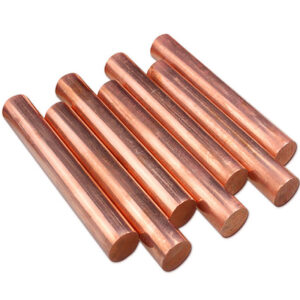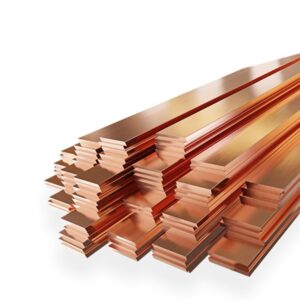BIS Certification for Coppers Rods, Stripes, Bars, Tubes etc as per IS 613:2000, IS 1897:2008, IS 4171:1983, IS 1545 :1994 AND IS 4412:1981
In the realm of electrical engineering and general engineering, the quality and reliability of materials are paramount. Copper, with its exceptional conductivity and versatility, stands out as a primary choice for various applications in these fields. However, ensuring that copper products meet stringent quality standards is imperative to guarantee safety, efficiency, and compliance. This is where Bureau of Indian Standards BIS certification of copper products comes into play, providing a mark of quality and conformity to specified standards. Let’s delve into the significance of BIS certification for different copper products and explore how Omega QMS Pvt Ltd facilitates the process.
INDIAN STANDARDS
IS 613:2000 COPPER RODS AND BARS FOR ELECTRICAL PURPOSES
 This standard covers the requirements for copper rods and bars for electrical purposes. The material shall be supplied in any one of the following conditions as specified by the purchaser: 0 – Annealed, HB – Half-hard, HD – Hard. Tensile Test, bend test, Radius on Edges, Electrical Resistivity Test are some of the tests stated for IS 613:2000. BIS certification of copper products under this standard ensures that copper rods and bars meet the prescribed criteria, thus assuring their suitability for electrical applications.
This standard covers the requirements for copper rods and bars for electrical purposes. The material shall be supplied in any one of the following conditions as specified by the purchaser: 0 – Annealed, HB – Half-hard, HD – Hard. Tensile Test, bend test, Radius on Edges, Electrical Resistivity Test are some of the tests stated for IS 613:2000. BIS certification of copper products under this standard ensures that copper rods and bars meet the prescribed criteria, thus assuring their suitability for electrical applications.
IS 1897:2008 COPPER STRIP FOR ELECTRICAL PURPOSES
 This standard specifies the requirements of copper strip for electrical purposes with drawn or rolled edges (either round or square) in the annealed , half hard and hard condition. The material shall be supplied in one of the following conditions, as specified by the purchase: a) 0 – Annealed (Soft), b) HB – Half-hard, and c) HD-Hard. Tensile strength, elongation, bend strength, edgewise bending, electrical resistivity test, tests for controlled proof resistance are some of the tests specified for copper strips. BIS certification of copper products in compliance with this standard guarantees that copper strips exhibit the requisite characteristics concerning dimensions, surface finish, conductivity, and resistance to environmental factors, thereby ensuring optimal performance and longevity in electrical systems.
This standard specifies the requirements of copper strip for electrical purposes with drawn or rolled edges (either round or square) in the annealed , half hard and hard condition. The material shall be supplied in one of the following conditions, as specified by the purchase: a) 0 – Annealed (Soft), b) HB – Half-hard, and c) HD-Hard. Tensile strength, elongation, bend strength, edgewise bending, electrical resistivity test, tests for controlled proof resistance are some of the tests specified for copper strips. BIS certification of copper products in compliance with this standard guarantees that copper strips exhibit the requisite characteristics concerning dimensions, surface finish, conductivity, and resistance to environmental factors, thereby ensuring optimal performance and longevity in electrical systems.
IS 4171 :1983 COPPER RODS AND BARS FOR GENERAL ENGINEERING PURPOSES
 This standard covers the requirements of copper rods and bars for general engineering purposes. Apart from chemical composition, mechanical properties such as tensile strength, dimensions, elongation at break, hygrogen embrittlement and radius on edges are specified in the standard.
This standard covers the requirements of copper rods and bars for general engineering purposes. Apart from chemical composition, mechanical properties such as tensile strength, dimensions, elongation at break, hygrogen embrittlement and radius on edges are specified in the standard.
BIS certification of copper products under this standard verifies that copper rods and bars possess the required mechanical properties, dimensional accuracy, and surface quality, making them suitable for a wide array of engineering applications.
IS 1545:1994 SOLID DRAWN COPPER AND COPPER ALLOY TUBES FOR CONDENSERS AND HEAT EXCHANGERS
 This standard covers the requirements of solid drawn ( seamless ) copper and copper alloy tubes of outside diameters 5 mm to 80 mm, both inclusive, for use in condensers and heat exchangers.In heat transfer systems like condensers and heat exchangers, the efficiency and reliability of tubes are critical. IS 1545:1994 specifies the standards for solid drawn copper and copper alloy tubes employed in these applications. BIS certification of copper products under this standard ensures that these tubes meet the stipulated requirements concerning dimensional accuracy, mechanical properties, corrosion resistance, and heat transfer characteristics, thereby ensuring optimal performance and durability in heat exchange systems.
This standard covers the requirements of solid drawn ( seamless ) copper and copper alloy tubes of outside diameters 5 mm to 80 mm, both inclusive, for use in condensers and heat exchangers.In heat transfer systems like condensers and heat exchangers, the efficiency and reliability of tubes are critical. IS 1545:1994 specifies the standards for solid drawn copper and copper alloy tubes employed in these applications. BIS certification of copper products under this standard ensures that these tubes meet the stipulated requirements concerning dimensional accuracy, mechanical properties, corrosion resistance, and heat transfer characteristics, thereby ensuring optimal performance and durability in heat exchange systems.
IS 4412:1981 COPPER WIRES FOR GENERAL ENGINEERING PURPOSES
Copper wires serve as indispensable components in various engineering applications, where flexibility, conductivity, and durability are essential. IS 4412:1981 outlines the standards for copper wires intended for general engineering purposes. BIS certification of copper products under this standard verifies that copper wires exhibit the necessary electrical conductivity, mechanical strength, dimensional accuracy, and resistance to environmental factors, making them suitable for diverse engineering applications.
QUALITY CONTROL ORDER (TECHNICAL REGULATION) ISSUED BY THE DEPARTMENT FOR PROMOTION OF INDUSTRY AND INTERNAL TRADE, MINISTRY OF COMMERCE AND INDUSTRY, GOVT. OF INDIA ON 17 OCTOBER 2023 FOR MANDATORY BIS CERTIFICATION
The DPIIT, Ministry of Commerce & Industry, Govt. of India, has issued an order, making it mandatory for all copper products listed above to be used in India, whether manufactured in India or imported from foreign countries, shall mandatorily carry the Standard Mark (ISI Mark) of the Bureau of Indian Standards under a valid BIS licence. In short, it has become obligatory for all the manufacturers of copper and copper products listed above, whether in India or overseas, to immediately apply for BIS licence and obtain a valid BIS certification licence before that the last date of implementation of the order, i.e., 16 April 2024.
BIS CERTIFICATION SCHEME
The BIS Standards, listed above, establish a comprehensive framework encompassing various quality parameters that copper rods, tubes and wires must adhere to. The Bureau of Indian Standards Certification Scheme is a vital framework established by the Indian government to ensure the quality, safety, and reliability of products available in the market. This scheme aims to safeguard consumer interests by setting stringent benchmarks and guidelines that products must meet before they can be deemed compliant. BIS certification covers a wide range of industries and products, encompassing the entire gamut of industrial and manufacturing activity. Various steps involved in the BIS Certification process are enumerated below:
- Standard Identification: Manufacturers identify the relevant BIS standard that applies to their chosen product category. These standards outline the specific quality, safety, and performance requirements that the product must meet.
- Application Submission: Manufacturers submit an application for BIS certification to the Bureau of Indian Standards (BIS), providing details about the product, its specifications, and the desired certification mark.
- Factory Inspection: BIS conducts an inspection of the manufacturer’s production facility to assess the quality control processes, infrastructure, and adherence to relevant standards.
- Sample Testing: BIS collects samples of the product from the manufacturer for testing in authorized BIS laboratories or recognized testing centers. These tests evaluate various parameters specified by the BIS standard.
- Certification Decision: Based on the satisfactory test results and compliance with standards, BIS decides whether to grant certification to the product. If approved, the manufacturer is issued a BIS certification license.
- Regular Monitoring: BIS monitors the manufacturing process of certified products through periodic audits and market surveillance to ensure ongoing compliance with quality control processes and standards.
OMEGA QMS PVT. LTD. – PARTNERING FOR SUCCESS
In the pursuit of achieving BIS certification and maintaining the highest levels of product quality, Omega QMS Pvt. Ltd. emerges as an invaluable partner for manufacturers. Backed by a global presence and a stellar track record of successful collaborations with Fortune 500 companies, Omega QMS provides an extensive array of services designed to streamline the certification process and ensure compliance with industry standards.
- Expert Guidance: Omega brings together a team of seasoned experts who possess in-depth knowledge of regulatory requirements, industry best practices, and intricacies of certification process. These experts guide manufacturers through the complex landscape, offering insights and strategies to navigate the process efficiently.
- Testing and Validation: Omega assists manufacturers in planning and executing necessary tests and validations required for BIS certification.
- Documentation and Compliance: The journey toward BIS certification demands meticulous documentation of processes, materials, and testing procedures. Omega aids manufacturers in creating comprehensive and accurate documentation that aligns with BIS requirements, reducing the risk of errors and rejections.
- Audit Support: Omega prepares manufacturers for BIS audits, which are a crucial part of the certification process. With its expertise, the organization ensures that manufacturers are well-prepared for audits, addressing any issues that may arise and increasing the likelihood of a successful outcome.
- Customized Approach: Each manufacturer’s journey toward BIS certification is unique. Omega understands this and tailors its services to fit the specific needs, challenges, and goals of individual manufacturers, ensuring a personalized and effective approach.
- Global Experience: With presence in over 40 countries, Omega brings global experience to the table. This international exposure allows the organization to offer insights into varying regulatory environments and industry practices, enabling manufacturers to excel globally.
Omega QMS Pvt. Ltd. functions as a strategic partner for manufacturers aiming to achieve BIS Certification. Its multifaceted approach encompasses expert guidance, process control, testing and validation support, documentation assistance, audit preparation, training, and a global perspective. By collaborating with Omega, manufacturers gain a competitive edge in their pursuit of certification while upholding the highest standards of product quality and consumer satisfaction.
For more details you can reach out to Omega at info@globalomega.com
In conclusion, BIS certification stands as a hallmark of quality and compliance for copper products in electrical and general engineering domains. With Omega QMS Pvt. Ltd. comprehensive assistance, navigating the intricacies of BIS certification becomes more manageable, enabling businesses to unlock new opportunities and enhance credibility in the market.

Leave a Reply